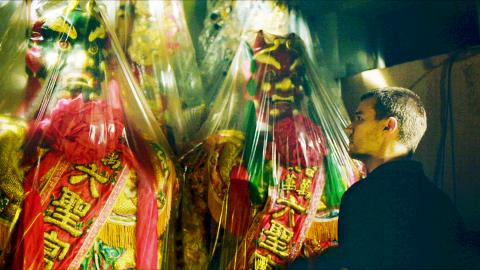When Dutch filmmaker David Verbeek visited Taiwan for the first time in 2007, he remembers being inexplicably drawn to its enigmatic charms.
“There was something about the atmosphere in the streets of Taiwan that I found very peculiar, totally different from what I had experienced anywhere else before in Europe or Asia. I couldn’t quite express it very well, but it felt mysterious, suspenseful and a little bit scary,” he says.
More than a decade later, the director’s love affair with Taiwan continues with An Impossibly Small Object, his latest feature that marks the third film that he has shot in Taipei. The movie made its world premiere at the recently-concluded International Film Festival Rotterdam and was one of eight nominees for the festival’s VPRO Big Screen Award, though it did not win. It is set for a commercial release in Taiwan on April 27.

Photo courtesy of David Verbeek
This year, a total of five Taiwanese films, including two shorts, were screened at the 47th edition of the film festival, considered by industry professionals as one of the most important in Europe. This included the world premiere of Hsiao Ya-chuan’s (蕭雅全) Father To Son (范保德), which was also in the running for the VPRO Big Screen Award, and Yang Ya-che’s (楊雅?) Golden Horse Award-winning film The Bold, the Corrupt and the Beautiful (血觀音).
In An Impossibly Small Object, Verbeek plays a Dutch photographer who takes a photograph of eight-year-old Xiaohan as she plays with her kite in a parking lot in nighttime Taipei. We are then transported into Xiaohan’s life, where she is faced with the impending separation from her childhood best friend, Hao Hao, who is migrating to New York.
The latter half of the film takes place in the Netherlands, where the photographer is confronted with his own loneliness and is reminded of his childhood by the photograph of Xiaohan.

Photo courtesy of David Verbeek
Much of the movie blurs the lines between the narrative and the documentary, with autobiographical elements of Verbeek’s experiences as a roving photographer weaved into the story. The 38-year-old even shot part of the film in his own house in Amsterdam.
Childhood, transition and displacement are central themes in the film, which also seeks to ask philosophical questions about the intricate relationship between a photographer and his subject.
“You see the struggle of the photographer because he is always traveling, and how he doesn’t feel at home anymore — this is something that I’ve also been dealing with in my own life,” says Verbeek, who has lived in Taiwan and other parts of Asia for extended periods. He is appearing as an actor for the first time in this film.
“I also wanted to make a film that was very much about photography,” he adds. “This film uses distortion of time and seeks out connections that are at first glance not there, such as the relationship between the photographer and his subject. Are the two connected somehow from the moment when the artwork, the photography, combines their existence?”
Shot within a period of three years, An Impossibly Small Object comes across as a quiet, lyrical ode to the everyday sights and sounds of Taipei. Immersive camerawork by cinematographer Morgan Knibbe takes the viewer though the corridors of aging residential buildings, sleepy alleyways, a bustling pepper shrimp restaurant along Zhongxiao Donghua (忠孝敦化) and the alluring nightscape of a city that never sleeps. The curious symbol of a life-size Chinese god puppet (神像) also recurs throughout the film.
“There is the notion that there is a deity or god in any religion that is all-seeing. This is linked to the photographer who is also an observer, whose occupation is to capture certain moments. In that sense the puppet and the photographer are one; the silent observers,” Verbeek says.
As his most “personal and experimental” film to date, the director admits that An Impossibly Small Object is a slight deviation from his previous works, which typically examine the changes in contemporary society and the nature of reality. For instance, his 2010 film, R U There, also shot in Taipei, explored the virtual world of gaming and the connection humans share with technologies and screens in the digital age.
He will be visiting both old and new ground in his next feature film, set to be shot in Shanghai where he is currently based. Titled Dead & Beautiful, the film will revolve around a group of rich people who play games with each other and begin to lose track of reality.
“My main fascination in my work is how nobody knows what reality is, and about the whole subjective nature of human experience,” he says. “This film is going to be a psycho-thriller, which is something new for me, but still containing the theme of nobody knowing what’s real, and what isn’t.”

Taiwan has next to no political engagement in Myanmar, either with the ruling military junta nor the dozens of armed groups who’ve in the last five years taken over around two-thirds of the nation’s territory in a sprawling, patchwork civil war. But early last month, the leader of one relatively minor Burmese revolutionary faction, General Nerdah Bomya, who is also an alleged war criminal, made a low key visit to Taipei, where he met with a member of President William Lai’s (賴清德) staff, a retired Taiwanese military official and several academics. “I feel like Taiwan is a good example of

March 2 to March 8 Gunfire rang out along the shore of the frontline island of Lieyu (烈嶼) on a foggy afternoon on March 7, 1987. By the time it was over, about 20 unarmed Vietnamese refugees — men, women, elderly and children — were dead. They were hastily buried, followed by decades of silence. Months later, opposition politicians and journalists tried to uncover what had happened, but conflicting accounts only deepened the confusion. One version suggested that government troops had mistakenly killed their own operatives attempting to return home from Vietnam. The military maintained that the

Jacques Poissant’s suffering stopped the day he asked his daughter if it would be “cowardly to ask to be helped to die.” The retired Canadian insurance adviser was 93, and “was wasting away” after a long battle with prostate cancer. “He no longer had any zest for life,” Josee Poissant said. Last year her mother made the same choice at 96 when she realized she would not be getting out of hospital. She died surrounded by her children and their partners listening to the music she loved. “She was at peace. She sang until she went to sleep.” Josee Poissant remembers it as a beautiful

Before the last section of the round-the-island railway was electrified, one old blue train still chugged back and forth between Pingtung County’s Fangliao (枋寮) and Taitung (台東) stations once a day. It was so slow, was so hot (it had no air conditioning) and covered such a short distance, that the low fare still failed to attract many riders. This relic of the past was finally retired when the South Link Line was fully electrified on Dec. 23, 2020. A wave of nostalgia surrounded the termination of the Ordinary Train service, as these train carriages had been in use for decades